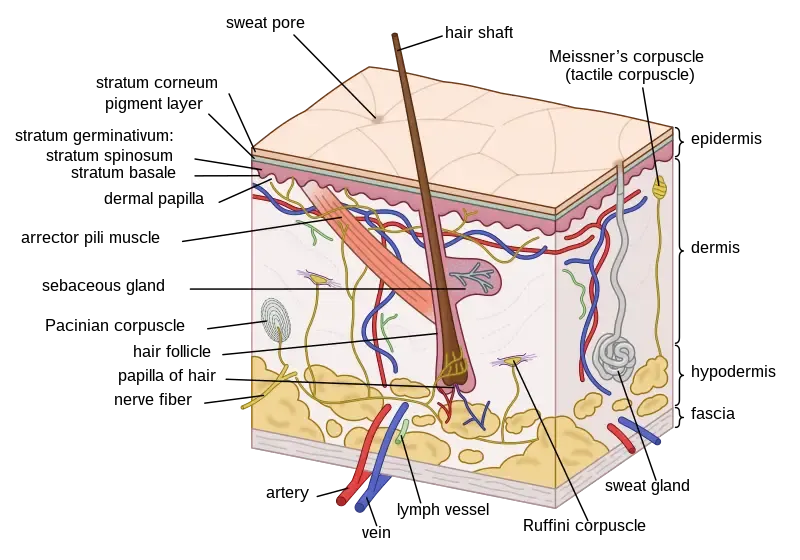The integumentary system is your body’s outermost layer and your first line of defense against bacteria and injury. It is composed of several organs and structures, including the skin, hair, nails, and glands, and it works together with other systems in your body to keep it balanced.
What is the Integumentary System?
The integumentary system is the largest organ system in your body, and it serves as a physical barrier between your internal organs and the external environment. It consists of your skin, hair, nails, and glands, and it is responsible for protecting your body from harmful bacteria and other microbes, regulating your body temperature, and allowing you to feel sensations such as heat and cold.
Image source: Tomáš Kebert & umimeto.org, CC BY-SA 4.0, via Wikimedia Commons.What Makes Up the Integumentary System?
The integumentary system consists of four main structures: skin, hair, nails, and glands.
- Skin: Your skin is the largest and heaviest organ in your body and is composed of three layers: the epidermis, dermis, and hypodermis.
- Hair: Your hair is made of a protein called keratin and consists of three parts: the shaft, follicle, and bulb.
- Nails: Your nails protect the ends of your fingers and toes and consist of the nail plate, nail bed, cuticle, matrix, and lunula.
- Glands: Your glands are found throughout your skin and include sudoriferous, sebaceous, ceruminous, and mammary glands.
Function of the Integumentary System
The integumentary system serves several important functions in your body. It provides physical protection against bacteria and germs, absorbs and helps heal abrasions, cuts, and other injuries, cushions and protects your body from infection, and protects you from the sun’s ultraviolet (UV) rays and sunburn. Additionally, it excretes sebum, sweat, and other waste from your body, regulates your body temperature, allows you to feel heat, cold, and detect other sensations, and synthesizes vitamin D.
Anatomy of the Integumentary System
Your integumentary system works together with other systems in your body to keep everything in check and working as it should. For example, it helps your immune system because it’s the first line of defense against bacteria and infection. It also sends white blood cells to injuries to begin the healing process. Additionally, your integumentary system helps you absorb vitamin D, which is crucial to your bone health because it affects calcium absorption.
Conditions and Disorders of the Integumentary System
Some of the most common conditions and disorders of the integumentary system are visible on your skin, hair, and nails. These conditions include allergies like contact dermatitis and poison ivy rashes, blisters from trauma, bug bites such as spider bites, tick bites, and mosquito bites, skin cancer, including melanoma, skin infections like cellulitis, skin rashes and dry skin, skin disorders like acne, eczema, psoriasis, and vitiligo, skin lesions like moles, freckles, and skin tags, wounds, burns (including sunburns), and scars.
Hair disorders can also affect your integumentary system, including hair loss due to various reasons such as alopecia areata, androgenic alopecia, anagen effluvium, telogen effluvium, traumatic alopecia, dandruff, head lice, hirsutism, etc.
Nail disorders are also a common condition affecting the integumentary system. The nails can be affected by onychomycosis, onchyolysis, psoriasis, lichen planus, paronychia, etc.
Gland disorders that may affect your integumentary system include hyperhidrosis, which is excessive sweating, and conditions affecting the sebaceous glands, such as acne and seborrheic dermatitis. Ceruminous gland disorders, like excessive earwax production, can also impact the integumentary system.
Taking Care of Your Integumentary System
To maintain the health and function of your integumentary system, it's essential to practice good hygiene and skincare habits. Some tips for taking care of your integumentary system include:
- Keep your skin clean by bathing regularly and using gentle soap or cleansers that don't strip away the skin's natural oils.
- Moisturize your skin daily with a suitable lotion, cream, or oil to prevent dryness and maintain its elasticity.
- Protect your skin from the sun by wearing sunscreen with a minimum SPF of 30, seeking shade when the sun is at its peak, and wearing protective clothing.
- Stay hydrated by drinking plenty of water to help keep your skin and other integumentary system components healthy.
- Eat a balanced diet rich in vitamins, minerals, and essential fatty acids to nourish your skin, hair, and nails from within.
- Avoid excessive exposure to heat, cold, or harsh chemicals that can damage your skin and other integumentary system components.
- Examine your skin regularly for any changes, such as new moles, growths, or discolorations, and consult a dermatologist if you notice anything unusual.
By following these tips and seeking medical advice for any concerns, you can help maintain the health and function of your integumentary system.
Conclusion
In conclusion, the integumentary system is a crucial part of the human body, serving as a protective barrier against harmful elements and regulating body temperature. It is made up of various organs and structures, including the skin, hair, nails, and glands, each with its unique function. While there are several common conditions and disorders that affect the integumentary system, proper care and treatment can help maintain the health and function of this essential system. Practicing good hygiene, protecting your skin from the sun, staying hydrated, and eating a balanced diet are all essential components of maintaining a healthy integumentary system.
